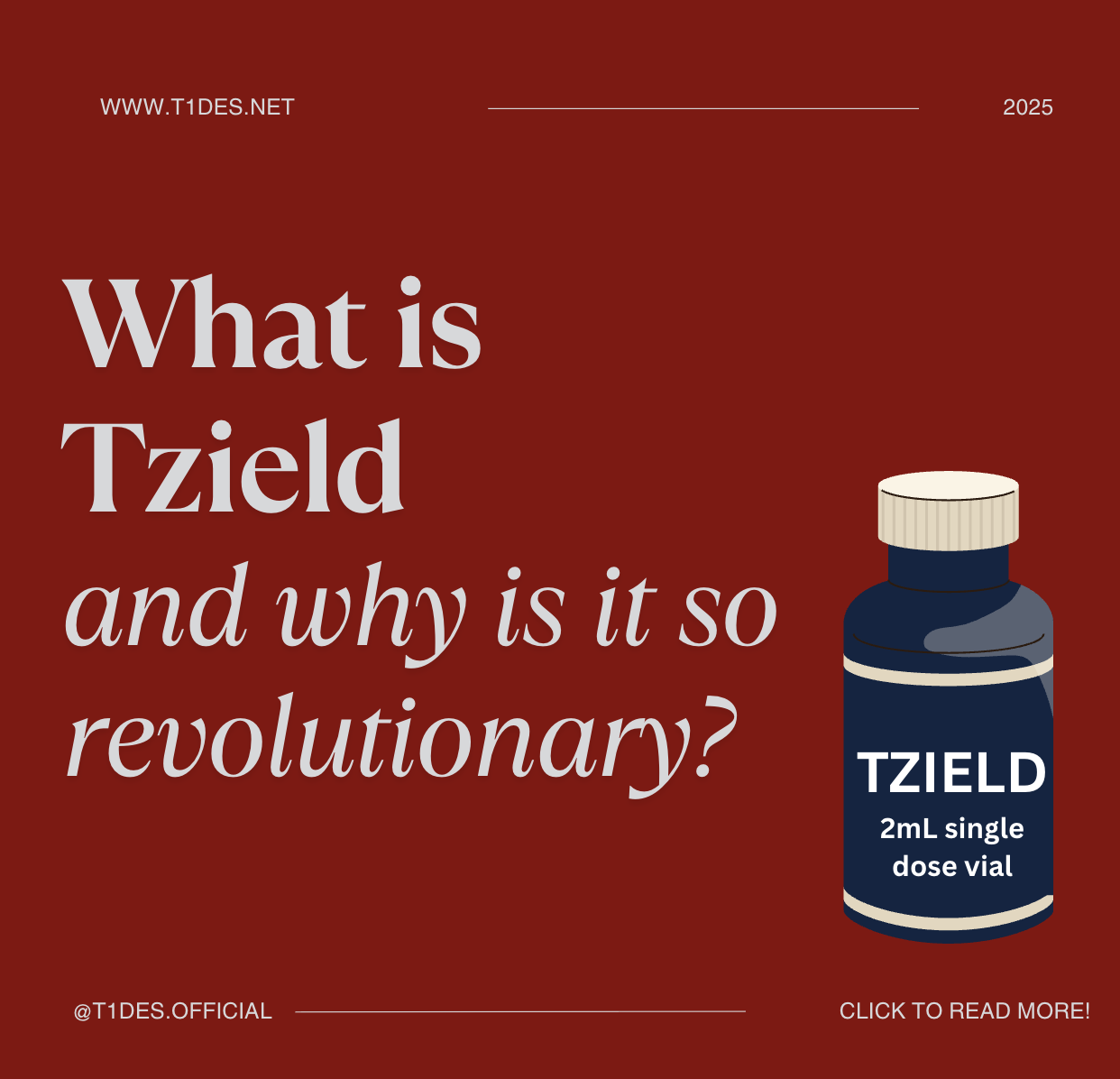For decades, type 1 diabetes (T1D) has been a disease without a possible cure. Diagnosed most often in children and adolescents, it’s an autoimmune condition where the body’s immune system attacks insulin-producing beta cells in the pancreas. Once those cells are gone, they can’t regenerate, and patients are left managing the disease for life with insulin therapy.
However, in 2022, the FDA made a groundbreaking decision: Tzield (teplizumab-mzwv) was approved, the first and only drug currently shown to delay the onset of type 1 diabetes. For the first time in medical history, we have a treatment that doesn’t just manage T1D–it actually modifies the disease process. Here’s what makes Tzield so incredible.
What is Tzield?
Tzield is a humanized anti-CD3 monoclonal antibody, which is a type of immunotherapy that targets CD3, a molecule found on the surface of T-cells. T-cells are key in the autoimmune destruction of the pancreas in the T1D disease process. By binding to CD3, Tzield temporarily modifies the activity of these T-cells, reducing their attack on pancreatic beta cells.
The medication doesn’t cure T1D or stop the disease completely. However, it does delay its clinical onset–the point at which someone requires insulin treatment–by an average of 2 years. This delay can be life-changing, especially for young children or teenagers who would otherwise need to start insulin treatments immediately after diagnosis.
The Role of Autoantibodies and Screening
To understand how Tzield works, it’s essential to understand how we can detect T1D before symptoms appear. In most cases, people are diagnosed only after they show symptoms like excessive thirst, frequent urination, weight loss, and severe fatigue. At that point, it’s possible they have already lost 80-90% of their insulin-producing beta cells.
However, science now allows us to detect T1D in its pre-symptomatic stages through islet autoantibody screening. These autoantibodies–such as IAA, GAD65, IA-2, and ZnT8–are markers in the blood that signal the immune system has begun attacking the pancreas. The presence of two or more of these autoantibodies is highly predictive of T1D.
That’s where Tzield steps in. It’s indicated for people aged 8 and older who are in Stage 2 T1D–meaning they have tested positive for multiple autoantibodies and abnormal blood sugar levels, but have not exhibited clinical symptoms yet. Administered as a 14-day IV infusion, Tzield can delay the transition to Stage 3 T1D, which is when the patient requires insulin therapy.
Why Tzield is so Revolutionary
For one, it shifts the T1D treatment process from the reaction stage to the prevention stage. Tzield introduces a pre-emptive treatment strategy–intervening before symptoms occur to preserve remaining beta cell function.
It also gives families time. A 2-year delay in diagnosis means postponing the need for insulin injections, blood sugar monitoring, and the pressure of managing diabetes. This can also delay risks of diabetic ketoacidosis. Most importantly, it gives families time to process the diagnosis and set up a care plan for the future.
Tzield is the first disease-modifying drug in T1D, but it most likely won’t be the last. Its approval by the FDA opened up doors for the exploration of immunotherapies and combination treatments with the hope of curing the disease altogether.
Wider autoantibody screening in children, especially those with a family history of T1D, is likely to become more common in coming years, as early detection becomes critical for intervention. Education outreach is needed to inform families that it’s now possible to delay T1D, and that this delay could offer major benefits.
It’s also important to note that access to Tzield could present challenges. As of 2024, a full course of Tzield could cost hundreds of thousands of dollars. Ongoing advocacy and policy changes will be key in ensuring Tzield becomes part of standard pre-T1D management.
Tzield doesn’t stop the progression of type 1 diabetes completely, but it slows it down in a way we’ve never seen before. For families at risk, it offers time. For the future of diabetes care, it’s a groundbreaking discovery that can lead to more research benefitting the lives of people predisposed to type 1 diabetes everywhere.
Sources
Herold, Kevan C., et al. “An Anti-CD3 Antibody, Teplizumab, in Relatives at Risk for Type 1 Diabetes.” New England Journal of Medicine, vol. 381, no. 7, 15 Aug. 2019, pp. 603–613, www.nejm.org/doi/full/10.1056/nejmoa1902226, https://doi.org/10.1056/nejmoa1902226.
Kawasaki, Eiji. “Anti-Islet Autoantibodies in Type 1 Diabetes.” International Journal of Molecular Sciences, vol. 24, no. 12, 11 June 2023, pp. 10012–10012, www.ncbi.nlm.nih.gov/pmc/articles/PMC10298549/, https://doi.org/10.3390/ijms241210012.
“Why TZIELD®? | TZIELD® (Teplizumab-Mzwv).” TZIELD® (Teplizumab-Mzwv) Patient Site, www.tzield.com/about-tzield/why-tzield.

Leave a Reply